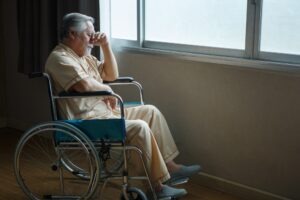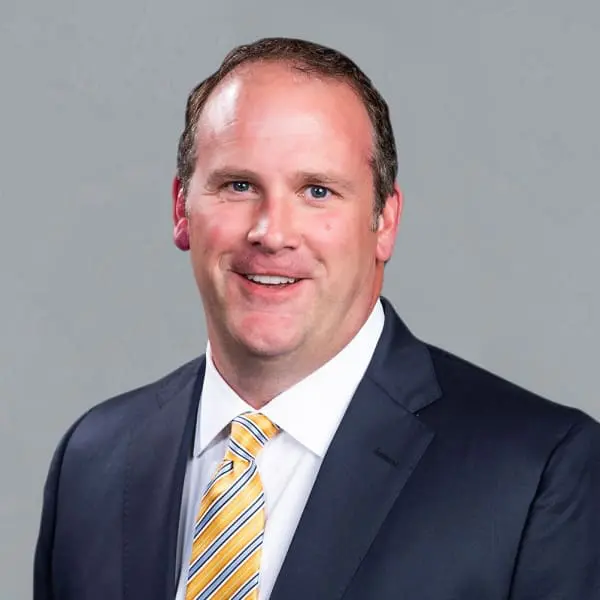
When it comes to protecting elderly rights, it is important to make sure that they are being properly cared for and respected. Unfortunately, elderly abuse and neglect in nursing homes is common. If you or someone you love is a victim of nursing home abuse, it is essential to seek legal advice from an experienced nursing home abuse and neglect lawyer.
A Heninger Garrison Davis, LLC personal injury lawyer will be able to help you understand your rights, advocate on your behalf, and ensure that you receive the compensation you deserve. With our help, we can provide you with the guidance and support needed to make sure that justice is served and that your loved one is given the respect they deserve.
Understanding Nursing Home Abuse and Neglect
Nursing home abuse refers to any intentional resident harm, mistreatment, or exploitation of elderly residents in long-term care facilities. This can include physical, emotional, sexual, or financial abuse. Nursing home neglect, on the other hand, refers to the failure to provide the necessary quality of care, assistance, or attention to meet the basic needs of the nursing home residents.
Nursing home abuse and neglect can have devastating effects on the physical and mental well-being of the nursing home resident. It can lead to serious injuries, emotional trauma, deterioration of health, and even death. Recognizing the signs of physical abuse and neglect is essential in identifying cases and taking appropriate action.
Common signs of abuse and nursing home neglect may include unexplained injuries such as:
- Bruises
- Fractures
- Infections
- Bed sores/pressure sores
- Dehydration
- Emotional distress
- Malnutrition
- Changes in behavior or mood
- Social withdrawal
- Poor hygiene
- Weight loss
- Medication errors
- Financial exploitation
- Sexual abuse
According to the National Council on Aging (NCOA), as many as five million older adults are abused every year in the United States. It is estimated that only 1 in 14 cases of abuse are reported, however.
For a free legal consultation, call (205) 326-3336
Why Should You Take Action?
When it comes to nursing home abuse and neglect, taking action is of utmost importance. It is not enough to simply be aware of the signs and understand the issue. We must actively intervene and seek justice for our elderly loved ones who have been mistreated.
Taking action is essential for several reasons, including the following:
- Sending a message: Taking action sends a clear message to the nursing home and its staff that abuse and neglect will not be tolerated. By holding them accountable for their actions, we create a safer environment for all residents.
- Deters similar treatment: It also serves as a deterrent to other living facilities, reminding them of the consequences they may face if they engage in abusive behavior.
- Support and care: Taking action ensures that the victim receives the support and care they desperately need. By involving the appropriate authorities and seeking legal assistance, we can ensure that the necessary medical attention is provided and that the victim’s well-being is prioritized.
- Initiate change for the better: Taking action can bring about much-needed change in the nursing home industry as a whole. By speaking out against abuse and neglect, we shed light on the issue and raise awareness. This can lead to improved regulations, better training for nursing home staff, and ultimately, a safer and more compassionate environment for all elderly residents.
Remaining Vigilant When Choosing Living Facilities
Elder abuse can be difficult to spot, especially if a resident has advanced dementia or has trouble communicating. Assess a living facility thoroughly before placing a family member there as a resident.
Ask friends and family for recommendations, visit the nursing facility to check for warning signs of neglect (physical abuse, emotional abuse, sexual abuse, financial abuse, etc.), check state records to see if the facility has ever had any violations, and so on.
What to Do If You See Signs of Nursing Home Abuse
If you suspect someone you know is the victim of nursing home abuse or neglect, it’s crucial to get the authorities involved quickly. In most cases, caregivers have a duty to report suspected elder abuse. Failing to report a nursing home negligence case may even constitute neglect in and of itself.
We highly recommend you speak with a nursing home neglect attorney at Heninger Garrison Davis, LLC, as we’re familiar with the different rules and laws regarding elder medical care in your state. We can tell you whether or not you may be eligible to file a nursing home abuse or neglect claim.
How Can an Elder Abuse Lawyer Help With Your Case?
A nursing home abuse lawyer can be your greatest ally when it comes to protecting the rights of your elderly loved ones. They have the knowledge, experience, and expertise to navigate the complex legal system and ensure that justice is served.
Understanding of Your Rights
One of the key ways a nursing home abuse lawyer can help is by providing you with a clear understanding of your rights. They will educate you on the laws and regulations surrounding nursing home abuse and neglect, as well as any potential legal recourse available to you. This knowledge is invaluable in empowering you to make informed decisions and take the appropriate legal action.
An Advocate on Your Side
A nursing home abuse lawyer will act as your advocate. They will investigate the case, gather evidence, and build a strong legal strategy to support your claim. They will negotiate with insurance companies and fight for the financial compensation you deserve. Most importantly, they will provide you with the emotional support and guidance needed during this challenging time.
Access to Resources
A nursing home abuse lawyer has a network of resources at their disposal. They can connect you with medical professionals who can assess the extent of the injuries and provide the necessary standard of care. They can also refer you to support groups or counseling services to help you and your loved ones cope with the trauma of the abuse.
Holding the Facility Accountable
By filing a nursing home abuse lawsuit, they not only seek justice for your loved ones but also send a strong message to the facility and its staff that their abusive behavior will not go unpunished. This can lead to positive changes within the nursing home industry as a whole, ensuring the safety and well-being of future residents.
8 Steps to Take When Taking Legal Action
Seeking legal assistance is a crucial step in addressing nursing home abuse and neglect. When you suspect victims of nursing home abuse, it is important to take action to protect their rights and hold those responsible accountable. Here are some steps to consider when seeking legal assistance.
- Document the evidence: Collect any evidence that supports your claim, such as photographs of injuries, medical records, and any written communication with the nursing home staff. This documentation will help your lawyer build a strong case on your behalf.
- Research nursing home abuse lawyers: Look for lawyers who specialize in nursing home abuse cases and have a proven track record of success. Read reviews, ask for referrals, and schedule consultations to find the right lawyer for your case.
- Schedule a consultation: During the consultation, discuss the details of your case with the lawyer. Ask about their experience, their approach to handling nursing home abuse cases, and what to expect throughout the legal process. Use this meeting to assess their expertise and determine if they are the right fit for your needs.
- Retain legal representation: Once you have found a lawyer who you feel comfortable with and trust, retain their services by signing an agreement. This will officially establish the lawyer-client relationship and allow them to start working on your case.
- Follow your lawyer’s advice: Your lawyer will guide you through the legal process, providing you with advice and representing your interests. Follow their instructions and provide any additional information or documentation they request to strengthen your case.
- Cooperate with the investigation: Your lawyer will conduct a thorough investigation to gather evidence and build your case. Cooperate fully by providing any information or witness testimony they require. This will help strengthen your claim and increase the chances of a successful outcome.
- Stay informed: Stay in regular communication with your lawyer and stay updated on the progress of your case. Ask questions, voice any concerns, and provide any new information that may arise.
- Be prepared for the legal process: Your lawyer will guide you through each step of the legal process, including negotiations, settlement discussions, and potentially, a trial. Be prepared to actively participate in these proceedings, and trust in your lawyer’s expertise to navigate them effectively.
How to Choose the Right Nursing Home Abuse Attorney
When it comes to choosing a nursing home abuse lawyer, it’s essential to find someone who has the right experience, expertise, and dedication to handle your case effectively. Here are some key factors to consider when making this important decision.
Experience With Nursing Home Cases
Look for a lawyer who specializes in nursing home abuse cases. This type of law can be complex, and having a lawyer who is well-versed in the intricacies of these cases is crucial. They will have the necessary knowledge and experience to navigate the legal system and fight for your rights.
Track Record of Success
Consider the lawyer’s track record of success. Look for a lawyer who has a proven track record of gaining good outcomes for their clients. This can give you confidence in their abilities and increase the likelihood of a positive outcome for your case.
Personality and Communication Style
It’s also important to find a lawyer who you feel comfortable working with and who you trust. Nursing home abuse cases can be emotionally challenging, so having a lawyer who is compassionate and understanding can make a big difference. Schedule consultations with potential lawyers to get a sense of their personality and communication style.
Resources
Find out about the resources and support that a lawyer can provide. A good nursing home abuse lawyer will have a network of professionals, such as medical experts, who can assess the extent of the injuries and provide the necessary care. They should also be able to refer you to support groups or counseling services to help you and your loved ones cope with the trauma of the abuse.
Fees and Costs
Consider the fees and costs associated with hiring a nursing home abuse lawyer. Most lawyers work on a contingency fee basis, which means they only get paid if they win your case. However, it’s important to discuss and clarify the fee structure during your initial consultation to avoid any surprises later on.
Contact a Nursing Home Abuse Lawyer Now
Protecting the rights of our elderly loved ones is crucial, especially when it comes to nursing home physical abuse and neglect. By seeking legal advice from our experienced nursing home abuse attorneys, you can ensure that justice is served and that your loved one receives the respect and care they deserve.
Remember, taking action is important, not only for the victim, but also for creating safer environments in nursing homes and bringing about positive change.
Even if you feel you are not ready to file a suit, consult one of the nursing home abuse and neglect lawyers at Heninger Garrison Davis, LLC as soon as possible so that you will know your options. We work on a contingency fee basis, so there’s no reason not to contact us now.
